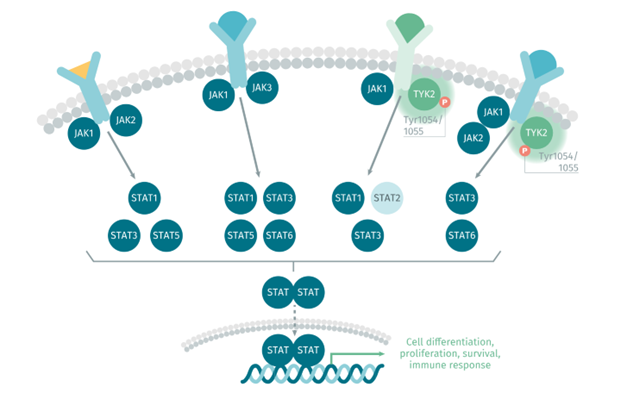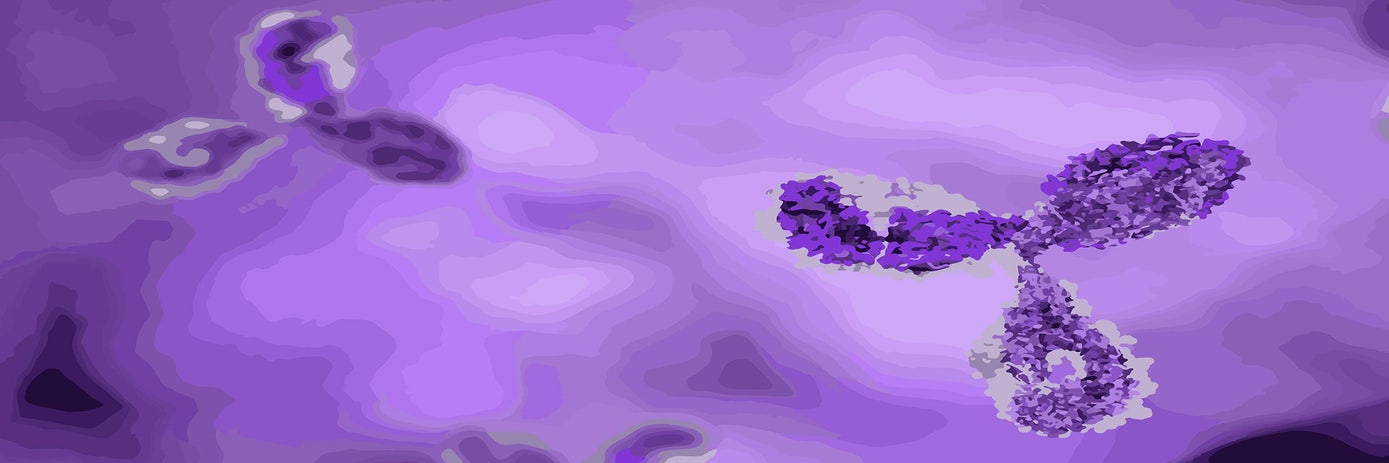
Over the last few decades, the Janus kinase (JAK)-signal transducer and activator of transcription (STAT) signaling pathway has gained attention from researchers due to its involvement in processes such as immunity, cell division, cell death, and tumor formation. Studies have shown that disrupted JAK-STAT signaling can contribute to the pathogenesis of various diseases such as skin conditions, cancers, and disorders affecting the immune system.
Many researchers are therefore exploring whether targeting members of the JAK and STAT protein families could be an effective therapeutic approach to treat conditions where these pathways are dysregulated.
JAKs play an important role in cytokine-mediated signaling and are key intracellular initiators of the JAK-STAT pathway. Non-receptor tyrosine protein kinase 2 (TYK2) was the first of the JAK family to be discovered. Other members include JAK1, JAK2, and JAK3.
The TYK2 pathway
TYK2 is an intracellular enzyme which associates with the cytoplasmic domains of type I and II cytokine receptors. JAK-STAT signaling is initiated when a ligand binds to a receptor, which causes receptor dimerization and subsequent activation of TYK2 and other members of the JAK family. Ligands include IL-12, IL-23, and Type I IFNs.
JAKs then transphosphorylate each other on specific tyrosine residues, generating docking sites for STATs. Activated STATs (STAT1, STAT2, STAT3, and STAT6) form dimers which can then translocate to the cell nucleus to induce transcription of genes regulating cell differentiation, proliferation, survival, and adapted immune response.
The TYK2 pathway is outlined below.

TYK Signaling Pathway
The role of TYK2 in disease
Various genetic This knowledge has led researchers to investigate the potential of targeting this pathway for therapeutic intervention.
Therapeutic strategies being explored include selective inhibition of members of the JAK family of proteins. Approved drugs targeting JAKs include: association studies have recognized TYK2 as a susceptibility gene for certain inflammatory and autoimmune diseases, including psoriasis, systemic lupus erythematosus (SLE), inflammatory bowel disease (IBD), rheumatoid arthritis, cancer, and diabetes.
- Fostamatinib for the treatment of chronic immune thrombocytopenia (ITP)
- Ruxolitinib to treat myelofibrosis and polycythemia vera
- Tofacitinib for rheumatoid arthritis, psoriatic arthritis, and ulcerative colitis
- Fedratinib, an anti-cancer medication used to treat myeloproliferative diseases including myelofibrosis.
However, most approved JAK inhibitors are pan-JAK, meaning they target more than one member of the JAK family. For example, the first-generation JAK inhibitor tofacitinib inhibits JAK1, JAK3, and to a slightly lesser extent JAK2. These pan-JAK inhibitors therefore have a broader inhibitory effect, but also present more side effects compared to the newer generation, which specifically target one JAK.
Selective TYK2 inhibition is gaining attention as a promising treatment approach for a wide range of autoimmune and inflammatory diseases, offering greater efficacy and fewer safety concerns than previous generations of medications. For example, Bristol Myers Squibb’s oral selective TYK2 inhibitor, deucravacitinib, is currently being tested in clinical studies across multiple immune-mediated diseases, and Nimbus Therapeutics announced in September last year that they were dosing psoriasis patients in the Phase 2b study of the company’s oral allosteric TYK2 inhibitor. It is hoped these drugs will overcome the challenges with safety/side effects experienced with other pan-JAK inhibitors.
Research opportunities
For researchers, targeting TYK2 and/or altering JAK/STAT signaling to reduce cytokine induced pro-inflammatory responses represents an attractive target for treating various autoimmune and inflammatory diseases.
We offer a range of no-wash assays to facilitate research targeting the JAK family. If you’re looking specifically at TYK2 or at parts of the JAK/STAT pathway, or cytokines involved (e.g., IL12, IL23, IFN-alpha, IFN-beta), we’ve got the tools needed to further your drug discovery research.
For research use only. Not for use in diagnostic procedures

































